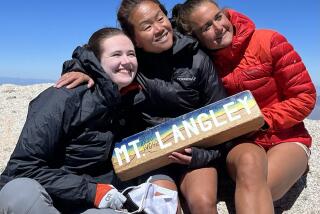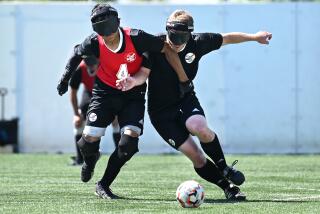Out of the Woods : Blind Sportsman Helps Initiate a Safe Hunting Law in Wisconsin
- Share via
There have been deaf musicians, legless marathon runners and even a one-armed major league baseball player.
But, a blind hunter?
Offhand, the idea seems preposterous. Ann Landers thought so, too.
When a Wisconsin state senator recently wrote to the advice columnist about what a “dumb idea” a new law to accommodate blind hunters was, Landers responded as one might expect.
“Permitting blind people to hunt does not make a whole lot of sense to me,” she said.
But Landers got only half the story.
Ann Landers, meet Robert Schuh, who will be out in the woods hunting for deer when the Wisconsin season opens Saturday. Schuh is totally blind.
What Schuh does is not so different in spirit from what Beethoven did when he could no longer hear the notes, or how Bob Wieland took 3 days to walk the Los Angeles and New York City Marathons on his hands because he lost his legs in Vietnam, and what outfielder Pete Gray did with the St. Louis Browns.
Granted, being in the same woods with a blind hunter carrying a loaded gun might make some people nervous, which explains Landers’ response to the senator’s letter.
But there’s more to know about Bob Schuh and the new Wisconsin law.
“I was the one that got the ball rolling,” said Schuh, who lost his sight in a hunting accident 12 years ago.
Schuh, 30, lives in Whitelaw, Wis., 35 miles southeast of Green Bay near the shore of Lake Michigan. He said that he was 18 1/2, “just out of high school, with a good job,” on that day he was walking through snow-covered brush along a railroad track, hunting rabbits. Suddenly, he tripped, and his shotgun discharged.
Said Syd Herman, a close friend: “He blew his face off. They found him on the tracks and thought he was dead.”
Besides blinding him, the shot blew away Schuh’s nose and part of his face.
Schuh said, however, “I was really fortunate that it didn’t get me under the chin.”
That’s how Schuh looks at life, with a zest that’s a marvel to those who know him.
“He has no problem doing anything,” said Herman, a conservation writer.
Schuh supports himself by writing and selling advertising for radio stations, running a 2-boat Lake Michigan fishing charter service with his brother, Rick, out of Two Rivers and selling rabbit traps and birdhouses he builds in his shop, using power tools.
“The only thing he can’t do is steer the boat,” Herman said. “He handles the tackle, baits the hooks, takes the fish off the hooks. He goes fishing by himself.”
Herman recalled stopping by Schuh’s shop one night to do a story on his carpentry work.
“After he finished, he asked me, ‘How’s that look?’
“I said, “I can’t tell. It’s too dark in here.’
“ ‘Oh,’ he said, ‘I forgot to turn on the lights.’ ”
In his spare time, Schuh heads the local Braille Club and serves on the boards of several outdoor organizations.
“He knows more what’s going on than any of ‘em,” Herman said.
Schuh also sticks his artificial nose into places some people think it doesn’t belong.
Alan J. Lasee, the state senator who wrote to Landers, was particularly perturbed when, with Schuh’s impetus, the state amended a hunting law to require blind hunters to be accompanied by a sighted partner. All 99 members of the state assembly, 27 of 33 state senators and Gov. Tommy Thompson approved it.
Lasee and 5 others voted against it, preferring to have no blind hunters at all.
“More than 600,000 people hunt deer during our 9-day season, and all are required by law to wear orange clothing,” Lasee wrote to Landers. “Maybe the supporters of this bill will insist that the hunters wear bells or, better yet, maybe the deer should.”
In a sense, Schuh said, Lasee is the one who is blind. Before the law was amended, he said: “It was nonsense. Blind people could hunt, no problem. Nobody ever said anything.”
Homer Moe, administrator of the state’s hunter safety program, said, “Hunting by blind people in Wisconsin and some other states has always been legal.”
Legal, Moe added, in the sense that “blind does not necessarily mean totally without sight. While 20/200 is legally blind, with the aid of extra optics, they can handle a firearm.”
But hit what? Schuh wondered. Herman says a blind hunter hasn’t had or caused an accident in Wisconsin in 50 years, but Schuh doesn’t think the implicit danger is worth the risk.
“Somebody who’s legally blind may be able to see only 50 or 100 feet,” Schuh said. “If a deer walks in that patch he can shoot at it, but he has no idea what’s beyond his target.
“Now it’s mandatory for anyone with a visual problem to have a sighted partner with them.”
Schuh forced the issue when he sought an either-sex deer hunting license 3 years ago. Until then, blind hunters could shoot only bucks, although disabled hunters could shoot either bucks or does.
“Our local game warden, Jim Aasin, told me, ‘I’ll send you the application, but I’m going to deny it.’
“I said, ‘Jim, why even bother?’
“He said, ‘Because I have to deny it. But do it, anyway, because then it goes to the regional office and you can appeal it.’
“Two weeks later I got a letter that it had been denied, and the same day I got a phone call from the regional office telling me, ‘Look, this is really a stupid law.’ ”
In time, though, the law was amended, with the stipulation that a blind hunter had to have a sighted companion.
It worries Schuh that many legally blind, partially sighted hunters will escape the net and continue to hunt alone. He has heard estimates running as high as 175 in his state.
“If that person can see enough to walk around, nobody else is going to know it,” Schuh said.
Schuh hunts with his brother. Because sound might alert the deer, their method is a system of simple hand movements against Schuh’s back. They don’t stalk the deer as much as they sit quietly in a likely spot and wait for one to come by.
“I’m sitting on a shop stool about 2 feet tall,” Schuh said. “I have a tripod in front of me and I put my hand there and the gun on top of my hand so I can go up or down with it. I use a shotgun (and slug-loaded shells) with open rifle sights on it--the notch in the back.
“Rick stands behind me with his hands on his knees, almost like a defensive back in football, and looks right over my shoulder. If he wants me to go up, he taps me higher, or down is lower and (the same) side to side. When I’m on target he draws a circle in the center of my back, and I shoot.”
As blind hunters go, Schuh isn’t a bad shot.
“When I target-shoot with my .22, I group inside of a 4-inch circle,” he said.
So far, Schuh hasn’t even shot at a deer, but he usually spends only a couple of hours at a time in the field.
“I don’t go out opening morning. I let my brother go do his (hunting). Normally, we sit at the end of the day, very similar to how people bow hunt.
“It doesn’t bother me if I don’t get a deer. I’m out for the sport, not the meat.”
Moe said, “The shot that is fired is infinitesimal to the rest of the hunting experience, even for blind people. The sounds, the smells are still there. They can experience the hunt.”
Schuh: “If you get yourself busted up in a car accident, does that mean you’ll never drive again?
“I go out now and talk several times a year to hunter safety courses on my experience. My message for them is, ‘Look, guys, whatever you learn in this course is fine, but if you don’t practice safety, accidents do happen.’ ”
Times researcher Peter Johnson contributed to this story
More to Read
Sign up for Essential California
The most important California stories and recommendations in your inbox every morning.
You may occasionally receive promotional content from the Los Angeles Times.













